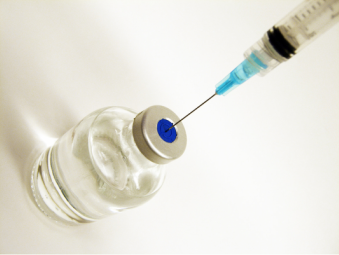http://www.ncbi.nlm.nih.gov/entrez/query.fcgi?cmd=Retrieve&db=pubmed&dopt=Abstract&list_uids=15046524
BioDrugs. 2004;18(2):79-93. Related Articles,Links
Immunological foundations to the quest for new vaccine adjuvants.
Burdin N, Guy B, Moingeon P.
Aventis Pasteur, Research and Development, Campus Merieux, Marcy l'Etoile,
France.
Developing efficient adjuvants for human vaccines that elicit broad and sustained immune responses at systemic or mucosal levels remains a formidable challenge for the vaccine industry. Conventional approaches in the past have been largely empirical and - at best - partially successful. Importantly, recent advances in our understanding of the immune system, most particularly with respect to early proinflammatory signals, are leading to the identification of new biological targets for vaccine adjuvants. This review covers both the current status of adjuvant testing in humans, the residual needs for vaccines in development, and the emerging immunological foundations for adjuvant design. A better understanding of the biology of toll-like receptors, non-conventional T cell subpopulations, T and B cell memory, regulatory T cells, and mucosal immunity has profound implications for a modern approach to adjuvant screening and development. The future lies in the high throughput screening of synthetic chemical entities targeting well-characterized biological molecules. Used alone or in combination, such synthetic adjuvants will allow stimulation or modulation in a safe and efficient manner of strong effector, regulatory and memory immune mechanisms.
PMID: 15046524 [PubMed - in process]
Toshiyuki Sugaia, , , Masaaki Moria, Masatoshi Nakazawab, Motohide Ichinob, Takuya Narutoa, Naoki Kobayashia, Yoshinori Kobayashia, Mutsuhiko Minamib and Shumpei Yokotaa
aDepartment of Pediatrics, Yokohama City University School of Medicine, Yokohama, Japan
bDepartment of Immunology, Yokohama City University School of Medicine, Yokohama, Japan
Received 25 September 2003; revised 2 September 2004; accepted 7 September 2004. Available online 21 June 2005.
Abstract
Adjuvants in vaccines are immune stimulants that play an important role in the induction of effective and appropriate immune responses to vaccine component(s). Diphtheria–tetanus–pertussis (DPT) vaccine contains not only aluminum hydrate (alum) to enhance the immune response to the vaccine ingredients, but also, both for that purpose and as a principal ingredient, pertussis toxin (PT). However, both adjuvants strongly promote T helper (Th) 2 type immune responses. Th1 and Th2 type immune responses are counterbalanced in vivo, and a Th2-prone immune response is not effective against intracellular infections but promotes IgE production, which is related to allergic disease. In this study, we used the CpG motif contained in oligodeoxynucleotide (CpG-ODN), which has an adjuvant effect and also induces the Th1 response, as an adjuvant to this vaccine, and we investigated its adjuvanticity and its potential to modulate immune responses to DPT vaccine. Administration of DPT vaccine with CpG-ODN (DPT-alum/ODN) to mice significantly reduced the total IgE levels and increased the anti-PT specific IgG2a titer in serum, in comparison with ordinary DPT vaccine (DPT-alum). Moreover, we investigated the antibody response to orally administrated ovalbumin (OVA) after vaccine administration. In the DPT-alum/ODN-administered group, the OVA specific IgE production in serum greatly decreased in comparison with that in the DPT-alum-administered group. These data indicate that CpG-ODN was not useful only as an efficient vaccine adjuvant but also shifted the immune responses substantially toward Th1 and modulated the Th1/Th2 immune response in DPT vaccine. These data suggested new applications of CpG-ODN as adjuvants in DPT vaccine.
Keywords: CpG motif; DPT vaccine; Th1/Th2; Adjuvant; Mouse
Corresponding author at: 3-9 Fukuura, Kanazawa-ku, Yokohama, Kanagawa 236-0004, Japan. Tel.: +81 45 787 2670; fax: +81 45 787 0461.
